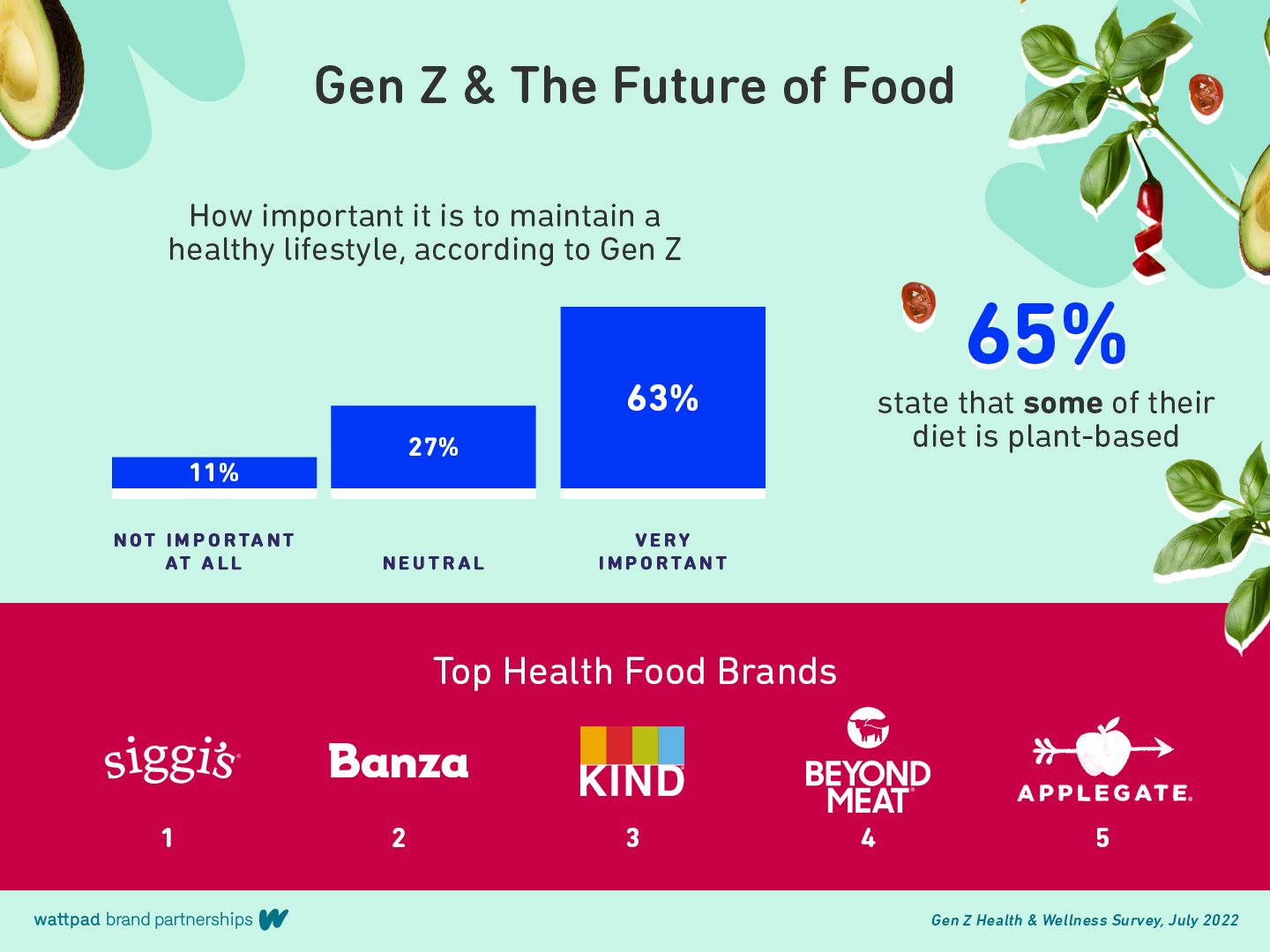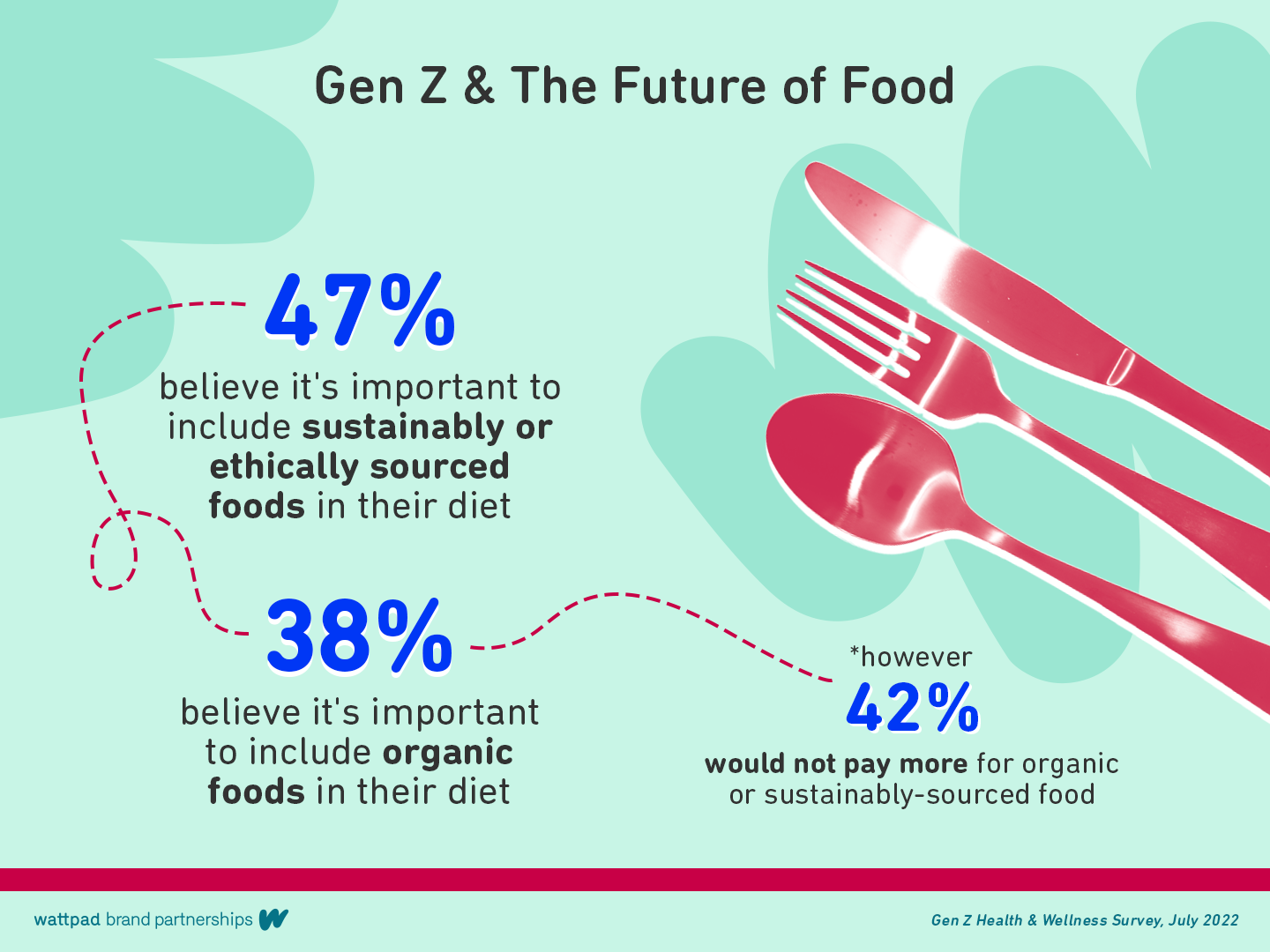You are what you eat: Gen Z & Future Food Trends
Food is fuel. But to Gen Z, it holds a deeper meaning. In fact, the generation’s eating habits are informed by cultural conditions specific to the era they’re living in.
To explore deeper into Gen Z’s relationship with food, we took it to our youth panel: Generation Wattpad. In a survey of 750 Gen Z respondents in the U.S., we found that food choices are both a means for self-expression and a life-preserver in a time looming with climate uncertainty.
Here are select findings for brands looking to connect to Gen Z through the power of food:
They are what they eat
Gen Z was raised to embrace their authentic selves, and social media has provided them with a platform to proudly broadcast who they are to the world. It should come as no surprise then, that when it comes to their dining habits, Gen Z has internalized the phrase “you are what you eat.”
 To Gen Z, food is a tool for self-expression and being a foodie is part of their collective identity. According to a recent study released by Cassandra, 53% of Gen Z respondents named TikTok as their source for new recipes. Gen Z has an appetite for unique food experiences, and they want to share their journey with others online.
To Gen Z, food is a tool for self-expression and being a foodie is part of their collective identity. According to a recent study released by Cassandra, 53% of Gen Z respondents named TikTok as their source for new recipes. Gen Z has an appetite for unique food experiences, and they want to share their journey with others online.
Savvy brands have taken note, and capitalized on the popularity of social media food trends. Take BBC Good Food. The food media brand is committed to supporting Gen Z by providing quick and easy recipes on its website that help them develop their culinary confidence in the kitchen. In recent months, BBC Good Food has made an effort to keep tabs on healthy TikTok food trends that they can commision for exclusive recipes, like their green goddess salad—making healthy eating more accessible in the process.
They're hungry for the future
When it comes to impact, Gen Z is conscious of their diet's effect on both their personal health and the health of the planet at large. Our youth panel was clear—environmental factors are pushing Gen Z towards reducing their meat intake and exploring vegan options. Fans of the Beyond Meat brand, 65% of the cohort stated that they include some plant-based foods into their diets. Plus, 47% reported that it’s important to include sustainable and ethically sourced foods into their diet. While the latter number has room to grow, it’s clear that tides have shifted from previous generations, and we predict demand for plant-based food choices to increase in the coming years.
 With this in mind, brands looking to win over Gen Z must incorporate climate action into their ethos. While slower to the jump, the fast-food industry is now doing just that. What was once a challenging space for vegans and flexitarians to navigate, fast food restaurants are finally incorporating plant-based alternatives into their menus. From Chipotle’s plant-based chorizo to Burger King's new vegan royale, and beyond (no pun intended), fast food companies are catching up.
With this in mind, brands looking to win over Gen Z must incorporate climate action into their ethos. While slower to the jump, the fast-food industry is now doing just that. What was once a challenging space for vegans and flexitarians to navigate, fast food restaurants are finally incorporating plant-based alternatives into their menus. From Chipotle’s plant-based chorizo to Burger King's new vegan royale, and beyond (no pun intended), fast food companies are catching up.
Moving along to the beverage menu—TAZO tea is leading the sustainability charge with its recent pledge to embrace regenerative farming practices. In a TikTok video, the company boldly claimed that every brand and corporation must radically reimagine their means of production in an effort to save the planet. For each view the video received, Tazo donated $1 to the Rodale Institute, a non-profit global leader in regenerative organic agriculture.
When it comes to food, Gen Z offers brands multiple avenues to connect with them. From participating in fun food-related TikTok trends to adapting to their concerns about the climate crisis—Gen Z is open to new culinary experiences from brands that listen and make the effort to truly understand them.
Is your brand looking to strengthen its climate initiatives? Learn more about How brands are measuring up against Gen Z’s environmental concerns.